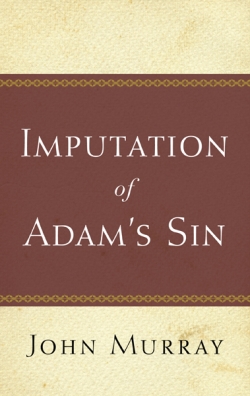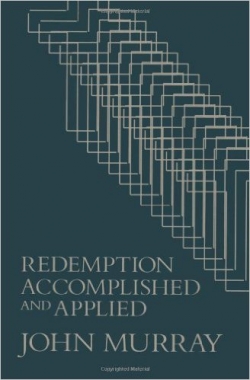The Imputation of Adam's Sin

Buy online ($)
Type
Book
Authors
ISBN 10
0875523412
ISBN 13
9780875523415
Category
Doctrine - Sin
[ Browse Items ]
Publication Year
1977
Publisher
Pages
98
Subject
Study on the biblical teaching of original sin
Tags
Description
Intermediate to advanced
"This classic work by John Murray studies the various interpretations of Romans 5:12-19, examining the syntactical construction, the sin contemplated, the union involved, the nature of the imputation, and the sin imputed. He surveys Pelagian, Roman Catholic, Calvinistic, and classic Protestant interpretations of this passage."
"This is Theology for Theologians, in other words it contains untranslated sections of Latin, technical terms from over 1,000 years ago, and distinctions made which are original to the author. Having said this, this is by far the best treatment of the subject. It is both careful and Biblical. It is also Reformed in ... Theology.
On the subject Murray takes the side of imputation (Charles Hodge and others) as opposed to the realist position (Shedd and others). He attempts to strengthen the imputation view by claiming that it is not a mere judicial declaration of accountability. '.... [T]he concept of human nature as defiled in Adam and transmitted to posterity by propagation is not the monopoly of the realist.' The imputation of Adam's sin so far as I know is seldom if ever combined with this component of the realist view (imputationists are generally creationists and not traducian), but this is what Murray seems to do.
Comparing this to the work of Christ, is it like saying we are justified by the imputed righteousness of Christ that is infused in us? Without further qualification this would be a contradiction. Aquinas sees the contradiction and dismisses imputation. Murray may just want to point out that it is Christ's righteousness that is imputed and not only the "judicial benefit"; likewise it is the sin of Adam which is imputed and not merely the consequences.
Murray makes a very good point here but he says more than that. This is an extremely fine line that is being drawn, but it is also an important one. On the transmission of Adam's sin protestant realists make a larger distinction between the offices of Adam and Christ, than do imputationists and for very good reasons.
This is of course to avoid the Thomist infusion of Christ's righteousness for our justification which would logically follow from the realist transmission of Adam's corruption if the analogy was close. John Murray (as do all other imputationists) sees the work of Christ and Adam as closely analogous since this camp has both the work of Christ and Adam imputed. For Murray however, imputation seems to involve some sort of transmission. This he claims to find in the Biblical presentation. He, of course, would say (unlike Thomas Aquinas) that the consequent righteousness of sanctification does not justify us. Another line I'm sure he would draw clearly (given more space) is that when our sin was imputed to Christ, it in no sense corrupted Him. It is this last idea which inspires Hodge and others to restrict the term "imputation" to a simple judicial accounting in all its' instances including the imputation of Adam's sin.
This classic view of imputation, unlike that of Murray, needs only one definition. This is in its' favor. Murray attempts in all of his Theology to bring it closer to the presentation of doctrine found in the Bible than most other Theologians do. The Bible is generally not systematic in its' presentation so Murray's work tends to be less systematic than that of others. The value of the book is its' brief, careful and Biblical treatment of a very difficult subject."
"This is an extremely dense book which is definitely worth reading. It contains the standard articulation of the Reformed view of man's relationship to Adam. If you purchase the book, or would just like to read a decent summary instead of buying it, perhaps the review below will be helpful. The paragraph breaks correspond with the chapter breaks.
In the opening pages Murray concerns himself with the parallelism contained in Rom 5:12. He argues that the surrounding section is a sustained argument that draws a strong analogy between the work of Adam and of Christ and the Christian's relationship to each. He begins by discussing the syntactical construction of 5:12 and then surveys and refutes the Pelagian and Roman Catholic views. He also surveys Calvin's view and while Murray agrees with Calvin's general conclusions, he believes Calvin's exegesis is inaccurate. He is critical of the Pelagian and RC views in that they do not seem to reflect the one man and one sin terminology with which Paul connects humanity with the first and second Adam.
What Paul is arguing according to Murray is that all of humanity stands with Adam as their representation to the extent that both his guilt and his corruption are imputed to them. And thus those who stand with Christ as their representative receive both forgiveness and righteousness by imputation.
Murray then examines more deeply the nature of man's solidarity with Adam. He interacts with the realist view and the representational view. These two views attempt to explain the specific ground of the imputation of Adam's first sin with humanity that goes beyond the simple fact that there exists genealogical solidarity between Adam and humanity.
The realist position, it seems is looking for a way to remove the difficulties regarding the punishment of someone for a sin in which he did not participate. The realist argues that human nature was present in its entirety in Adam and that each person thereafter is an individualization of this human nature and is therefore guilty of Adam's sin. But since they were really present in seed form in Adam, it is just to hold them guilty for there participation in Adam's sin. Adam's sin is therefore imputed to humanity in an immediate way. In the representational view, Adam's sin is imputed to humanity in the very same way (parallelism again) that Christ's righteousness is imputed to the believer.
Murray says that mediate imputation emphasizes the hereditary corruption as the medium or means by which Adam's sin is imputed to his posterity. This is to say that man sins because he is born corrupt, but he is only guilty in that he himself sins as a moral agent. Murray characterizes the immediate position as God looking on posterity as being one with their father Adam and their sin coexisting with his just as if it were theirs. He then argues for immediate imputation in four extended arguments.
The first seems to me to be the most compelling and easiest to summarize. Murray's basic exegetical point stemming from Romans 5 has been that Paul's "one sinned" and "all sinned" language refers to the same sin viewed from the participation of Adam and his posterity. In other words, there is exact correlation between the manner and nature of sin of Adam and his posterity. Thus, since there is not any medium between Adam's sin and the death inflicted upon him, neither should we interject any medium between the sin and punishment in the case of Adam's posterity.
Chapter Four is probably one of the more difficult to comprehend and summarize, especially because of his use of Latin terminology which he does not define. But with the use of a Latin dictionary, Murray's critique of Hodge on imputation and his alternative position become clearer. Hodge argues that the imputation of Adam's sin to his posterity consists simply in the obligation to satisfy justice, i.e., the exposure to punishment on account of Adams sin - the reatus poenae. Murray responds that the reatus poenae, may be imputed only if the reatus culpa is also imputed. In other words, the demerit, or guilt of Adam's sin must also be imputed as possession of his posterity before any obligation to satisfy justice can also be imputed. The guilt is the ground of the punishment.
So, Murray contends that the biblical teaching on imputation is hung delicately between two poles. On one hand, it is more than judicial liability, but it is less than considering posterity to have eaten the fruit in the same way that Adam did - it was his action not theirs. The biblical position is that in Adam's sin, humanity was constituted sinners in the same manner that the elect are constituted as righteous - parallelism again."
Number of Copies
1
| Library | Accession No | Call No | Copy No | Edition | Location | Availability |
|---|---|---|---|---|---|---|
| Main | 139 | 1 | Yes |




